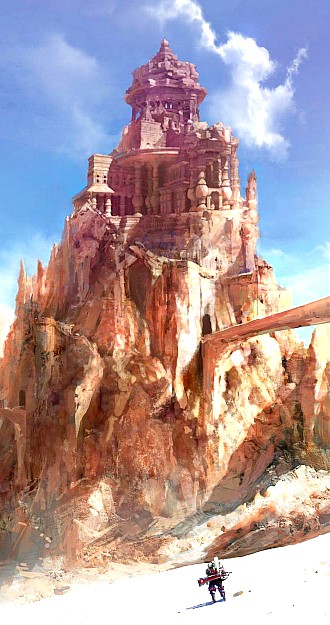Xynnar
The Oasis City

- Music:
It is the first and last thing you see before you are trapped in the wasteland of the Susari desert. It is an oasis to travelers, but do not be fooled. Xynnar is home to villains, slavery, and the largest black market on Lasmaira.
Carved into the Plateau, Xynnar borders the Susari dessert and the Kyythine Savanna. The city streets run deep into the earth, but also tower far above the land. Xynnar is cut into two via the gorge that scars the earth, one side belonging to the Merchants Guild; honest salesmen, Black market, Slave trading; the other, larger part being the homes and businesses of the people.
The city is sectioned off quite strangely. The further upwards you go, the poorer the people become, while the deeper you go, the richer people are, with the Palace deep in the center of the plateau. This is to protect the Royal family from attacks and the heat of the desert.
The gorge holds a long river, the only source of water for thousands of miles, and an oasis that is home to the Temples of Xynnar, worshiping it's First King. Bridges connect the two sides of the city both above, and within the gorge.
Main languages:
Common, mostly spoken by travelers, but many natives know it as well.
Sxyth, a language mostly spoken by native slaves and their masters.

Laws
Caste System:
Inhabitants are cut into four castes; Nobility, Military, Civilian, and Slaves.
The First caste is exclusive to the bloodlines of the noble people. Those who have a strong connection to magic, and a long line of proficient mages, have more power in the city, with the Royal line at the top. They have little to no restrictions.
Noble Bloodlines:
- Karai: The Karai Bloodline has been present since the city was in its construction. They have ruled over the city with an iron grasp. They have unlimited power and little to no restrictions.
- Issa: A rich Noble bloodline, who greatly funds, and profits off of the slave trade. One of the first families to have slaves.
- Seervai: Many of the members are leaders or members of the Merchant's Guild.
- Bhaiji: Lesser Nobles, who have many sources of income, many of them being illegal or not recommended for those with a desire to stay out of prison.
- Araoz: The Patriarch of the family has a say in how the Military runs.
The Military caste is exclusive to the trusted individuals, hand picked by the Royal family. They have mild restrictions, but only those given to them by their superiors. The protect the free people of Xynnar and bring to justice those who break their laws.
Civilians are those who work in the city for payment, those who sell wares or work in shops, etc. Certain restrictions are placed on them, such as a curfew, travel restrictions, and limits on what they can sell or what jobs they can have based on their wealth, race, gender, and age.
Slaves are essential to the city. They serve many of the Noble families, some even treasured for their beauty and exotic qualities. A slave that is from another country, has lighter hair such as red or blonde, or has light skin, is often sought after. They have the most restrictions placed on them, often not being allowed to leave the home, have other jobs, see their families, wear certain clothes, or even speak. Those who don't work for the nobility, work for the city. They make the repairs, clean things, and do the jobs most citizens refuse to do.
Where they work is also based on their race. Many human and elven slaves work for the nobility as servants, Orcs are often used for muscle or protection, and the dwarves, halflings, satyrs are used in the city. This is not always the case, but it is a general occurrence.
Many families say that they treat their "servants" is with the utmost care, but any slave would tell you otherwise. They are denied meals, whipped, and locked away in punishment, and that is only a scratch on the surface. While some slaves are born into their "profession" many are stolen away from other countries, many coming from the Island of Zikrus, and the surrounding area.
History
Xynnar has seen the beginning of civilization. The crevice along the Plateau was shelter to





